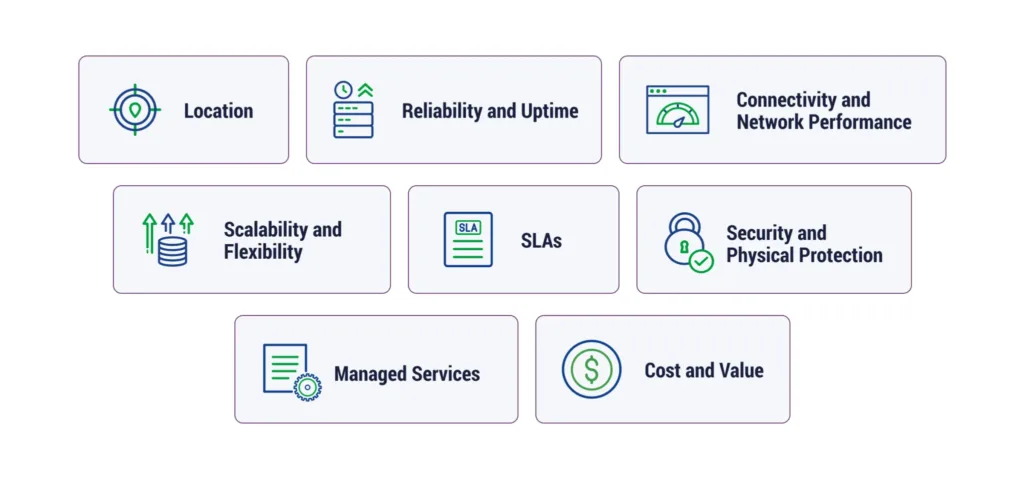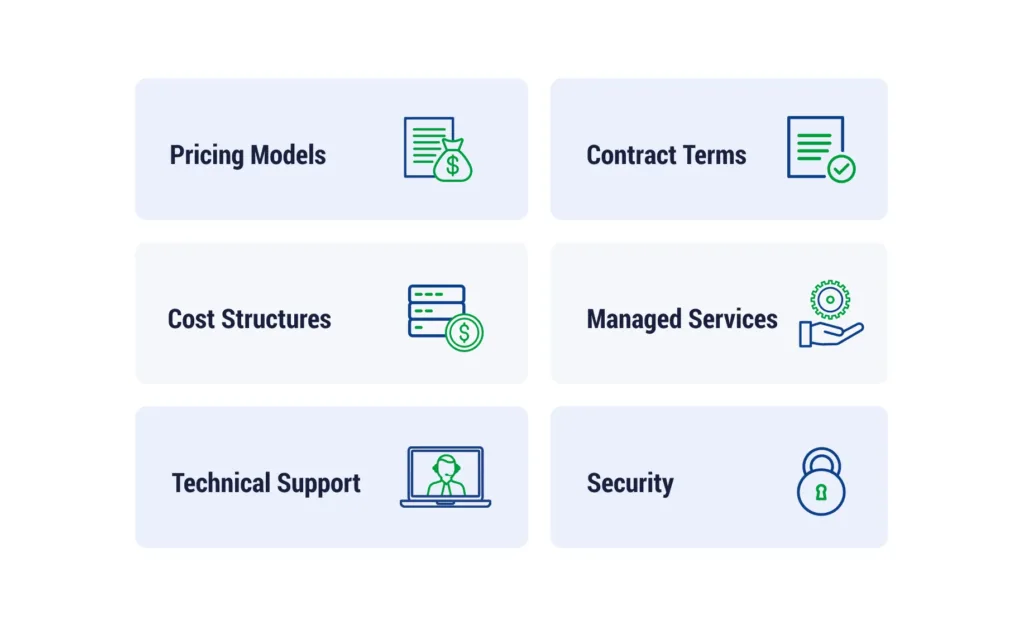
As businesses increasingly recognize the advantages of colocation services, the process of selecting the right colocation provider has become a critical decision for IT leaders. With so many options available in the market, it can be difficult to find the ideal partner. However, by understanding the fundamentals of colocation along with key factors to consider, it can be easier to narrow down the list.
Whether you’re considering colocation for the first time or evaluating new providers, this guide will equip you with the knowledge needed to make a well-informed decision during your search for the best colocation provider.
What is a Colocation Provider?
A colocation provider is a company that rents out space in its data center facility to organizations who need a secure off-premises location to host their IT infrastructure, such as servers, networking equipment and storage systems.
Organizations can leverage a colocation provider’s robust and redundant infrastructure while maintaining control over their own hardware and software configurations. Using a colocation provider is an excellent choice for businesses who are looking to transition from CapEx to OpEx as a way to optimize IT spending. A colocation provider offers the power, cooling, physical security, and network connectivity needed for the optimal operation of the hosted equipment without the need to invest in and manage a dedicated facility
8 Key Considerations When Selecting a Colocation Provider
When strategizing how to choose a colocation provider, there are 8 key considerations to keep in mind that will greatly benefit your organization:

Physical Location of Colocation Facility
When choosing a colocation facility, it’s crucial to consider its physical location for multiple reasons, including:
- Speed and user experience: The geographic proximity of the colocation facility to users or critical business locations can significantly influence network latency, data transfer speeds, and overall user experience.
- Disaster recovery and business continuity: Selecting a provider that’s located in a region that’s typically less prone to natural disasters reduces the risk of related disruptions that hinder business continuity thus encouraging better uptime.
- Data protection and data control: Data protection regulations, compliance, and data control requirements may necessitate choosing a provider within specific jurisdictions.
- Physical accessibility: How far is the physical location from your IT teams? How long will it take them to arrive onsite for regular maintenance or in the event of a disruption?
Reliability and Uptime
Any amount of downtime can have a significant impact on operations and revenue. With that, it’s necessary to understand the prospective colocation provider’s SLAs and history for reliability and uptime.
During your evaluation, look for certifications such as Tier III or Tier IV data center standards, which serve as a greenlight in ensuring high availability and redundancy in power, cooling, and network connectivity. By choosing a provider with a consistent, proven track record of high reliability and uptime, businesses can minimize the risk of service disruptions, unplanned outages, and associated data loss.
Connectivity and Network Performance
As with downtime, inconsistent connectivity and poor network performance can shine a negative light on organizations. They directly impact efficiency and responsiveness, not to mention user experience. By prioritizing reliable connectivity and top-notch network architecture, organizations can ensure seamless and efficient data transmission, improved application responsiveness, IT resiliency, and better overall user satisfaction.
When researching colocation providers, take into account their network connectivity options and whether they’re a carrier-specific or carrier-neutral data center. Selecting a provider that offers robust network options can help ensure optimal network performance and consistent low-latency connections.
Scalability and Flexibility
The goal of any organization is to grow, and it’s ideal to form partnerships with third parties who can keep up as you expand. Otherwise, you may have to plan a data center migration down the road if you outgrow the capabilities of the colocation provider. So, ask yourself: will they be able to accommodate future growth and changing needs? Will they be able to quickly scale up or down as requirements evolve?
To ensure your organization can easily expand your IT infrastructure as things change, make sure the colocation provider offers scalable infrastructure, such as:
- Rack space
- Power density
- Cooling capacity
Flexibility, in terms of resource allocation, contract terms, and customization options, is also key in allowing organizations to quickly adapt and tailor the colocation services to their specific needs during growth spurts. With scalable and flexible solutions, organizations can avoid overprovisioning or being limited by the infrastructure’s capacity, enabling efficient resource utilization and the abilityto go-to-market more quickly.
SLAs
Service Level Agreements (SLAs) are crucial contracts between colocation service providers and clients that outline metrics (such as uptime, availability, and response time) and the full range of services and support expected from the provider. Robust SLAs provide accountability, ensuring the provider commits to a certain level of service quality and reliability.
Before selecting a colocation provider, review their SLAs with legal and IT teams to ensure the understanding of contractual formalities and terms, as well as the availability of comprehensive support services, including 24/7 technical assistance, remote hands support, etc., alongside expected colocation services. By prioritizing SLAs and support, organizations can have confidence in the provider’s commitment to service excellence, operational reliability, and their ability to provide timely assistance when needed.
Security and Physical Protection
A provider should have robust security measures in place, including access controls, surveillance systems, and security personnel, to prevent unauthorized access and mitigate physical threats. Data center facilities should adhere to industry standards and certifications, such as SSAE 18, SOC 2, ISO 27001, etc., demonstrating their commitment to security and compliance.
By choosing a provider with strong security measures, organizations can feel confident in…
- The confidentiality, integrity, and availability of their data
- Being protected against physical attacks or breaches
- The ability to mitigate risks associated with unauthorized access or data theft
Keep in mind that although colocation providers can also offer virtual security measures, unless specifically outlined in the SLA, organizations need to be vigilant about their own security protocols to prevent unauthorized access, data breaches, and other cybersecurity threats.
Managed Services
Does the colocation provider offer add-on managed services to clients? By opting for managed services, organizations can offload certain operational tasks and responsibilities to the provider, such as hardware installation, maintenance, security updates, performance optimization, monitoring, and troubleshooting. This grants IT teams more time to focus on their core business activities while relying on the provider’s specialized knowledge and resources.
Cost and Value
Cost and value are key considerations when choosing a colocation provider as they directly impact the financial viability and return on investment for organizations. While cost is a crucial factor, it’s equally important to assess the value proposition offered by the provider. A thorough evaluation of pricing models, contract terms, and cost structures helps with transparency and cost predictability. Additionally, consider the value-added services provided by the provider, such as managed services, technical support, and security measures.

By weighing the cost against the overall value delivered, organizations can make an informed decision that align with their budgetary constraints while making sure the colocation provider offers the necessary services, support, and infrastructure to meet their operational requirements effectively.
Choosing the Right Colocation Provider
Choosing the right colocation provider is a pivotal step that can profoundly impact the performance, security, and growth of your organization’s IT infrastructure. By carefully considering the key factors discussed above, you can make an informed choice that aligns with your unique requirements.
At TierPoint, we understand the criticality of colocation services and have a proven track record of delivering reliable, secure, and scalable solutions to our clients across state-of-the-art facilities. Learn more about our colocation services or schedule a tour of one of our world-class data centers.

